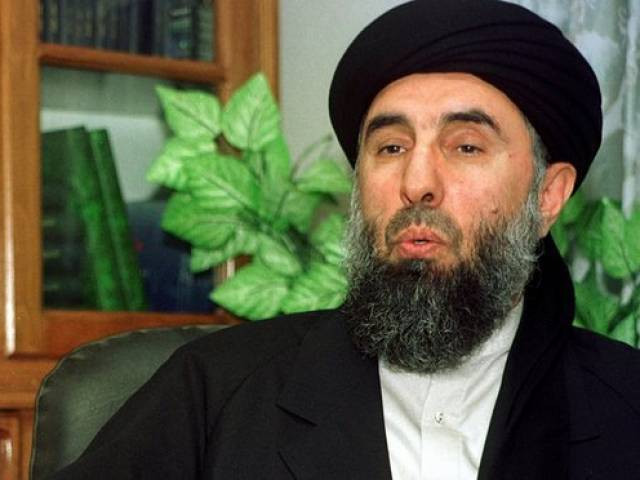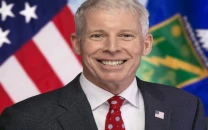Afghanistan inks peace deal with warlord 'butcher of Kabul'
Taliban dismiss peace accord as 'political marriage"

Former Afghan Prime Minister Gulbuddin Hekmatyar speaks to a Reuters correspondent in Tehran Febuary 5, 2002. PHOTO: REUTERS
Hekmatyar has a history of war crimes and has spent years in hiding. Ghairat Baheer, the head of Hizb-e-Islami's political commission, confirmed that the "historic" peace agreement was signed via telephone from Kabul.
Peace deal still on hold
Hekmatyar, who heads the now largely dormant Hizb-e-Islami, is the latest in in a series of controversial figures that Kabul has sought to reintegrate in the national mainstream. “The Hizb-e-Islami will officially announce its decision to undertake political activities in the country in line with Afghanistan's laws, in order to end war permanently, and restore sustainable peace and security in the country,” the 25-point agreement read.
“With the agreement, Hizb-e-Islami will declare a ceasefire, terminate its military struggle and dismantle its military establishment,” the peace deal stated. A copy of the agreement is available with The Express Tribune.
The agreement was signed by lead negotiator Mohammad Amin Karim, head of High Peace Council (HPC) team Maulvi Attaurrahman Saleem, Afghan National Security Adviser Mohammad Hanif Atmar, and head of the HPC Pir Sayed Ahmad Gillani.
Historic Afghan peace deal in two days: negotiator
Hekmatyar, whose whereabouts have been unknown since the US-led invasion in 2001, will return to Kabul within weeks to seal the agreement with President Ashraf Ghani. The deal with Afghanistan's second-largest militant group marks a symbolic victory for President Ghani, who has struggled to revive peace talks with the more powerful Taliban.
Earlier, the government said an "initial draft agreement" would be signed on Thursday by Hekmatyar's delegation and Afghanistan's High Peace Council (HPC), responsible for reconciliation efforts with militants. "Fortunately, after two years of negotiations between the Afghanistan's High Peace Council and the Hizb-e-Islami, the peace negotiations have been successfully completed, and a (draft) agreement between both sides has been finalised," the HPC said in a statement.
Dr Abdullah says he doubts Pakistan’s peace role
"This peace agreement will be implemented after it is formally signed by President Ghani and Gulbuddin Hekmatyar," it added, without specifying a date. Hekmatyar was a prominent anti-Soviet commander in the 1980s and stands accused of killing thousands of people in Kabul during the 1992-1996 civil war.
He is widely believed to be living in hiding in Pakistan, but his group claims he remains in Afghanistan. The potential deal has sparked revulsion from human rights groups.
"(Hekmatyar's) return will compound the culture of impunity that the Afghan government and its foreign donors have fostered by not pursuing accountability for the many victims of forces commanded by Hekmatyar and other warlords that laid waste to much of the country in the 1990s," Human Rights Watch said last month.
Abdullah gives up opposition to peace deal, says Hizb-e-Islami
According to an initial draft agreement seen by AFP, the government will offer Hekmatyar legal immunity in "all past political and military proceedings" as well as release Hizb-e-Islami prisoners. Hekmatyar is designated a "global terrorist" by the US and is blacklisted by the UN. The Afghan government will likely work towards lifting those restrictions in order to reintegrate him into local politics.
The deal is not likely to have an immediate impact on the security situation in Afghanistan. Hizb-e-Islami has been largely inactive in recent years, with its last big attack in Afghanistan in 2013 that left 15 people including five Americans dead. The US State Department had earlier said Washington was not involved in the talks but welcomed the truce with Hekmatyar.
The Taliban, who were toppled from power in 2001, have refused to engage in talks with the Western-backed Afghan government as they ramp up their nationwide offensive against it. The Taliban have dismissed the deal as a "political marriage".



















COMMENTS
Comments are moderated and generally will be posted if they are on-topic and not abusive.
For more information, please see our Comments FAQ